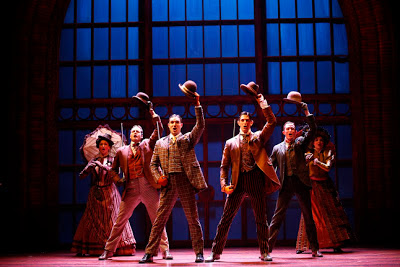Monday, July 15, 2013
Hello, No Irony
When I was in D.C., about three months ago, I went to see Hello Dolly at Ford's Theater. I like musical theater, though I'd never seen Hello Dolly before. It was jarring. The musical was first produced on Broadway in 1964, and the story is set around the turn of the 20th century. The society portrayed in the show is not modern--it reflects the prejudices of the time the show was written--and the show is a comedy, whose premise and jokes are generally anti-feminist. That the show was anti-feminist is not particularly interesting--I imagine that Hello Dolly isn't much worse on that score than the rest of America's pop-cultural output in 1964. But it's not 1964 anymore.
The production at Ford's presented the show without irony, or cynicism. The laugh lines were delivered as written, told without comment from the director or actors: punchlines were directed at women, instead of at those who would seek to curtail women's freedom. Watching the play was strange, as though I had been transported to 1964, when these jokes were funny (most of the crowd was laughing along. The actors sold the jokes well.).
I get why the show might still be produced in 2013: the music. People love the music. And the music is good, I guess. But does a modern production need to mimic the historical context of the original production just to showcase its music?
Performing Hello Dolly might always be problematic, no matter what sort of direction is given. But a healthy dose of irony couldn't hurt. It was deeply strange to be audience to a show unabashedly asking me to laugh at jokes with women as the punchline. With irony, the punchlines might sound different, and the object of all those problematic jokes might change enough to make them palatable. This, of course, means modernizing the show. It means updating the show to appeal to a modern audience, and changing the way the play comes across--contravening the intent of its authors. Doing this adds a directorial meta-comment about the show's worldview.
I love history and, in a sense, what I saw was history. I saw a production as it might have been given in 1964--a sort of reenactment of a musical in an earlier time. But why? Reproducing Hello Dolly this way is sort of like remaking any movie from 1964 shot-for-shot and line-by-line. Why do that?
The production, otherwise, was mostly good--great acting, awesome costuming, though there were a few moments of incoherent blocking near the end. Still, despite the quality of the production, I'm not sure why it was done. Was the music and the costuming enough to justify a production selling retrograde society?
Subscribe to:
Post Comments (Atom)


No comments:
Post a Comment